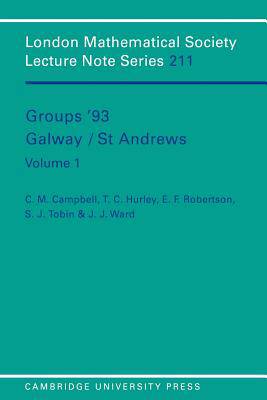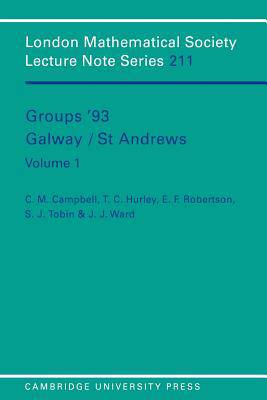
Je cadeautjes zeker op tijd in huis hebben voor de feestdagen? Kom langs in onze winkels en vind het perfecte geschenk!
- Afhalen na 1 uur in een winkel met voorraad
- Gratis thuislevering in België vanaf € 30
- Ruim aanbod met 7 miljoen producten
Je cadeautjes zeker op tijd in huis hebben voor de feestdagen? Kom langs in onze winkels en vind het perfecte geschenk!
- Afhalen na 1 uur in een winkel met voorraad
- Gratis thuislevering in België vanaf € 30
- Ruim aanbod met 7 miljoen producten
Zoeken
Omschrijving
This two-volume book contains selected papers from the international conference "Groups 1993 Galway/St Andrews", which was held at University College Galway in August 1993. These two volumes represent the wealth and diversity of group theory. Five main lecture courses were given at the conference. These were "Geometry, Steinberg representations and complexity" by J. L. Alperin (Chicago), "Rickard equivalences and block theory" by M. Broué (ENS, Paris), "Cohomological finiteness conditions" by P. H. Kropholler (QMW, London), "Counting finite index subgroups" by A. Lubotzky (Hebrew University, Jerusalem), and "Lie methods in group theory" by E. I. Zel'manov (University of Wisconsin at Madison). Articles based on their lectures, in one case co-authored, form a substantial part of the Proceedings. Another main feature of the conference was a GAP workshop jointly run by J. NeubÜser and M. Schönert (RWTH, Aachen). Two articles by Professor NeubÜser, one co-authored, appear in the Proceedings. The other articles in the two volumes comprise both refereed survey and research articles contributed by other conference participants. As with the Proceedings of the earlier "Groups-St Andrews" conferences, the articles in these Proceedings will, with their many references, prove valuable both to experienced researchers and to postgraduates interested in group theory.
Specificaties
Betrokkenen
- Auteur(s):
- Uitgeverij:
Inhoud
- Aantal bladzijden:
- 320
- Taal:
- Engels
- Reeks:
- Reeksnummer:
- nr. 211
Eigenschappen
- Productcode (EAN):
- 9780521477499
- Verschijningsdatum:
- 16/03/1995
- Uitvoering:
- Paperback
- Formaat:
- Trade paperback (VS)
- Afmetingen:
- 152 mm x 229 mm
- Gewicht:
- 471 g

Alleen bij Standaard Boekhandel
+ 236 punten op je klantenkaart van Standaard Boekhandel
Beoordelingen
We publiceren alleen reviews die voldoen aan de voorwaarden voor reviews. Bekijk onze voorwaarden voor reviews.









